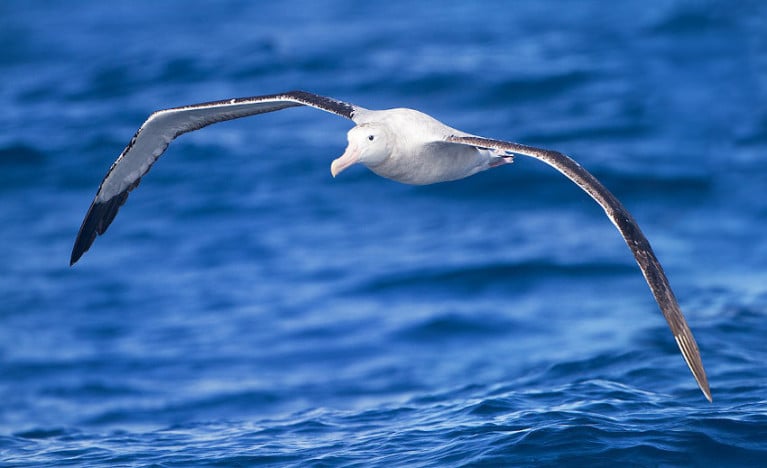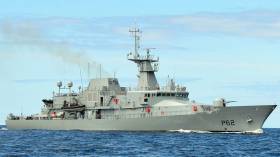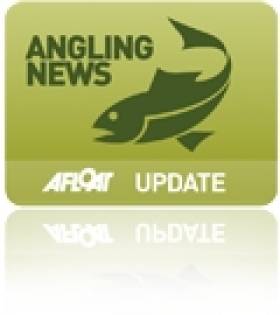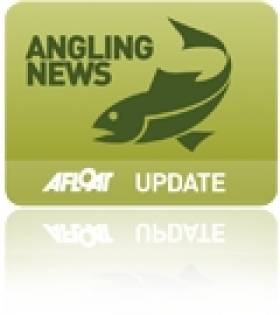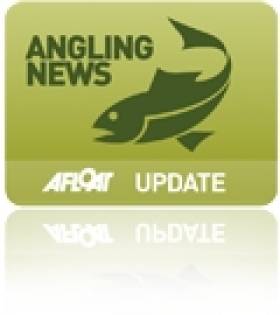Displaying items by tag: Illegal Fishing
Scientists Use Albatrosses To Spy On Illegal Fishing Fleets
A team of scientists in France are ‘recruiting’ albatrosses to monitor fishing fleets in the ocean for illegal activity.
Smithsonian Magazine reports on the findings of a new study detailing efforts to tag the “sentinels of the sea” with tiny GPS trackers. These can detect short-range radar emissions from trawlers that may be acting suspiciously.
The team at CNRS, the French National Centre for Scientific Research, chose albatrosses to carry the devices as their extraordinary range at sea often exceeds that of aircraft and even some satellites in the most remote regions — and they tend to be attracted to fishing vessels as a food source.
In one six-month study of the Indian Ocean, researchers found that more than a quarter of fishing vessels detected at sea by the birds were not trackable on AIS — suggesting illegal fishing was afoot.
Smithsonian Magazine has much more on the story HERE.
#NavalService - Use of drones by the Irish Naval Service is set to be stepped up in a bid to clamp down on illegal fishing and pollution offenses at sea.
Remotely operated pilot air systems writes the Irish Central have been identified by naval chiefs as essential for obtaining intelligence and keeping a check on Ireland's vast marine territory.
Sources also said naval operations tasked with gathering video evidence of illegal fishing and pollution offenses at sea as ones which would benefit from advanced drone technology.
The growing support for expanding the usage of drones on maritime missions follows the success of a pilot trial in the Mediterranean last year which saw the LE Eithne become the first naval vessel to use drone technology during its deployment on humanitarian rescue operations.
The missions, part of the EU-led Operation Sophia (see LE James Joyce deployment) trialed the Phantom 4 PRO, drones which can stay airborne for 35 minutes and which have a maximum range of eight kilometers.
More on the drone development, click the link here.
Two Prosecuted Over Illegal Fishing Incident On River Boyne
#Angling - Inland Fisheries Ireland (IFI) was successful in a court case brought against two men accused of illegal fishing and impeding authorised officers of IFI on the River Boyne in 2013.
At Navan District Court on 28 May, David Tuite of Drogheda, Co Louth was fined €400 for impeding an IFI authorised officer and ordered to pay total costs of €683 to IFI within six months, with 40 days imprisonment in default of payment.
Meanwhile, John O’Brien, also of Drogheda, was fined €800 for impeding an IFI authorised officer and ordered to pay costs of €683 to the IFI within six months, with 50 days imprisonment in default of payment.
The court heard that after midnight on 8 August 2013, fisheries officers Kevin O’Brien, Val Woods, Robert Bergin and Philip Duff from the Drogheda district were undertaking a covert surveillance operation following reports of illegal fishing at Proudfootstown, Co Meath.
They detected a number of men including David Tuite and John O’Brien who were acting suspiciously on the River Boyne and who were suspected of attempting to take fish illegally.
When intercepted by IFI staff, one of the men impeded the officers by throwing a bag he was carrying into the river, while the second man attempted to run away and refused to give his name when required to do so by the officers.
Both men were present at Navan District Court and pleaded guilty to impeding authorised officers in carrying out their duties in the execution of powers under Section 301 (7) of the 1959 Fisheries Consolidation Act.
Judge Conal Gibbons was very forceful in his support of the actions of IFI staff on the night in question. He stated that fisheries officers carry out difficult work in difficult places at unsociable hours.
He commended the work of officers O’Brien, Woods, Bergin and Duff, and stated that people should not interfere with the work of fisheries officers in the execution of their duties.
The River Boyne was one of the most salmon-prolific rivers on the East Coast, and in the 1980s approximately 10,000 salmon ran the system. This declined to an all-time low in 2006 when less than 1,000 salmon were caught on the river.
In 2006, IFI introduced a series of conservation measures in order to combat the decline in salmon numbers. The River Boyne is open for catch and release angling in an effort to conserve our native population of Atlantic salmon.
IFI has a Freefone number for the public to report poaching and pollution incidents at 1890 34 74 24 or 1890 FISH 24.
Two Prosecuted For Illegal Fishing of Spawning Salmon
#Angling - Two men have been prosecuted in Co Tipperary for illegal fishing of spawning salmon.
Michael Harding of Bansha and Neill Collins of Cullen were prosecuted by Inland Fisheries Ireland (IFI) following investigations on the River Aherlow at Angelsboro, Co Limerick on 2 January this year.
IFI fishery officer Noel Power told Judge William Early at a sitting of Fermoy District Court on 3 May that both men has been observed fishing by night with a lamp and a spear.
Having heard the evidence, Judge Early convicted both men and levied fines on each: €350 for Collins and €300 for Harding, who informed the court he was unemployed. Both men were also ordered to pay costs amounting to €418.90.
"Wild Atlantic Salmon are part of our heritage," said Minister Fergus O’Dowd following the prosecution, "and the killing of spawning fish is an environmental outrage.
"I once again commend the work of IFI staff, working in remote areas, in the worst of weather, late at night protecting our wild salmon."
IFI reminds all anglers that interference with fish over their spawning beds is a serious offence, and that its staff are involved trying to stamp out this activity.
Much illegal fishing takes place at night, and IFI staff patrol the rivers during winter nights to ensure the protection of fish stocks.
"This illegal fishing is both barbaric and a threat to spawning salmon," says the fisheries agency. "Spears and modified forks are sometimes used in tandem with lights in the illegal killing of spawning salmon."
Inland Fisheries Ireland Has Success in Illegal Fishing Cases
#ANGLING - Inland Fisheries Ireland (IFI) has had success with two recent court cases in the Drogheda and Dundalk areas, resulting in fines of €1,550 issued and expenses of €2,101 awarded.
In the Dundalk district, Vladimir Prokopieve was found to be using nets at Drumcar Lake in Inniskeen, Co Monaghan in September 2011 with the intention of taking coarse fish and pike illegally.
Prokopieve was apprehended by Assistant Inspector Ronan O’Brien and was found to have more than four coarse fish over 25cm in his possession, as well as pike exceeding 50cm.
Following a number of summons issued to the defendant, the case was heard at Dundalk District Court on 22 March. Prokopiev appeared in court and entered a guilty plea.
Judge Sean McBride convicted him under Section 95 of the 1959 Fisheries Act in relation to fishing in fresh water for coarse fish by means other than rod and line. He also convicted him for breaches of the coarse fish Byelaw 806 of 2006 and the conservation of pike Byelaw 809 of 2006.
The defendant was fined a total of €1,400 with one month to pay, while Inland Fisheries Ireland was awarded €927 expenses for bringing this case.
In the Drogheda district, Derek Nugent was found to be fishing out of season on the River Kells Blackwater, a tributary of the River Boyne, on 8 October 2011.
Under the salmon conservation laws, the River Boyne has been catch and release for salmon since 2006 in an effort to preserve the valuable salmon stocks.
Nugent was apprehended by Assistant Inspector Gerry Conaty and an on-the-spot fine of €150 was issued with 21 days to pay. The fine was not paid and a summons was issued to Nugent.
This case was heard on 14 March at Navan District Court, and Nugent pleaded guilty. Judge McMahon made it clear that the defendant had brought the prosecution on himself by his failure to pay the fine and ultimately by giving a false name and address.
Judge McMahon convicted him under section 301 of the 1959 Fisheries Act and fined him €150 with €1,174 expenses awarded to Inland Fisheries Ireland with six months to pay.
Inland Fisheries Ireland encourages members of the general public to report incidences of report poaching and pollution by calling 1890 347 424 or easier recall 1890 FISH 24.


























